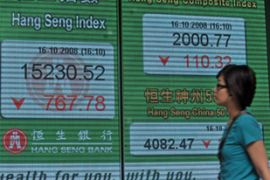Markets volatile on recession fears
US stocks fluctuate while Asia and Europen markets plunge amid recession fears.

Earlier, John Terrett, Al Jazeera’s correspondent at the New York stock exchange, said that inflation figures, released on Thursday, meant that confidence had been boosted prior to opening.
The US consumer price index remained stable for September, seeing no further rise from August’s 0.1 per cent increase in the prices paid for goods and services.
“That’s the first time that [inflation has remained stable] in more than two years,” said Terrett.
“It was because airline tickets are coming down in price, the price of automobiles are coming down and fuel coming down as well.”
“Make no mistake, though, the overriding fear here is of a recession in the US spilling over to the rest of the world,” Terrett said.
European concerns
European stock markets suffered sharp losses for a second straight day, with the London FTSE 100 index of leading shares falling 5.35 per cent to close at 3,861.39 points.
France’s CAC 40 lost 5.92 per cent to finish at 3,181 and the Frankfurt Dax closed down 4.91 per cent at 4,622.81.
| IN DEPTH | ||
|
|
Leaders in Europe have pushed for a co-ordinarted overhaul of the global financial system.
Speaking at a two day summit in Brussels, Nicolas Sarkozy, the French president, said: “We do not have the right to miss this opportunity for reconstructing our system of finance for the 21st century.”
At the summit Sarkozy was given a mandate by 27 Euro leaders to propose the overhaul to George Bush, the US president, at a meeting at Camp David in the US on Saturday.
Sarkozy has called for a root-and-branch reform of the global financial system, including currency reforms, a revamp of the International Monetary Fund and curbs on big bonuses for financial high-flyers.
The EU has already endorsed a multi-billion-dollar initiative by its 15 eurozone members to rescue banks brought to their knees by the financial crisis.
Europe saw further state relief efforts on Thursday, with the Swiss government announced that it would take a near 10 per cent stake – worth $5.2bn – in UBS, the Swiss banking giant.
The Swiss central bank also lent UBS $54bn to transfer its non-liquid assets into a separate fund.
The Swiss bank is looking to bolster its funds in the wake of the global economic crisis. Tens of millions of deposits have been withdrawn from the bank over the past weeks amid fears over the bank’s stability.
Markets down
In Asia, Hong Kong share prices closed 4.8 per cent lower while share prices in South Korea, Singapore, Taiwan and New Zealand were also sharply lower.
Tokyo’s Nikkei stock index plunged 11.41 per cent by the close of trading, the biggest loss in two decades.
Japan’s benchmark index has lost more than 23 per cent this month.
Taro Aso, the Japanese prime minister, put the losses down to the “insufficient” US bank bailout, a $700bn plan to secure American financial institutions.
Aso told parliament that “since it [the bailout] was insufficient, the market is again falling sharply”, reflecting investors’ sentiment that the government intervention may not be enough to stave off recessions across the globe.
Though financial rescue packages around the world have helped alleviate the pressures on the banking system, they will do nothing to prevent a serious economic slowdown.
Concerns about the global economic outlook are clear also in the price of oil, which has fallen another $1.28 to $73.26, a new 13-month low.
